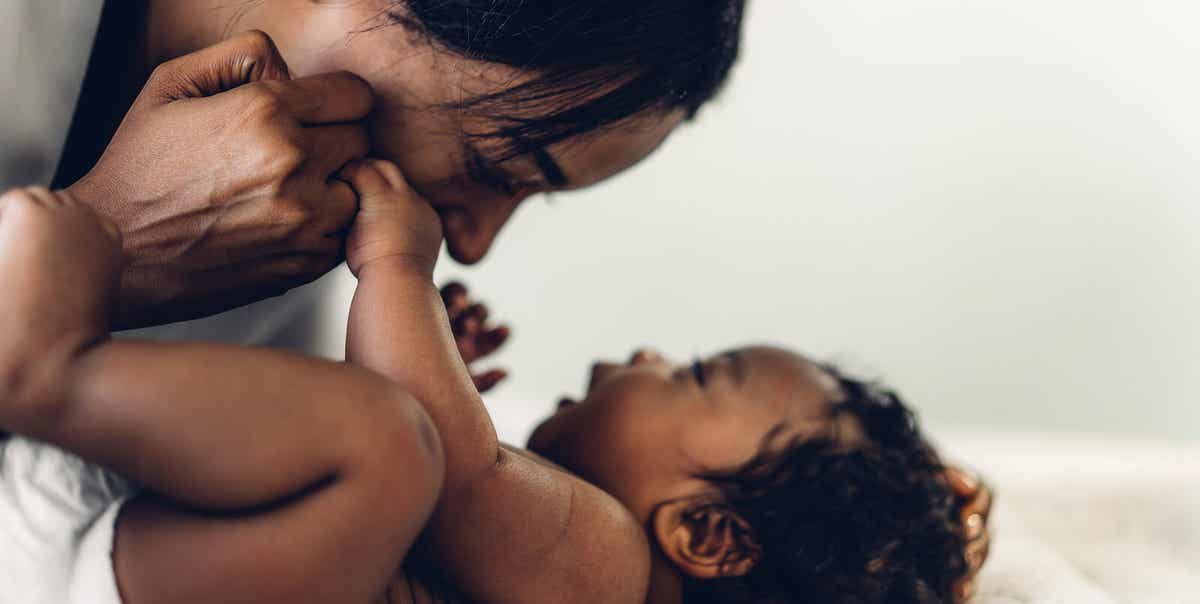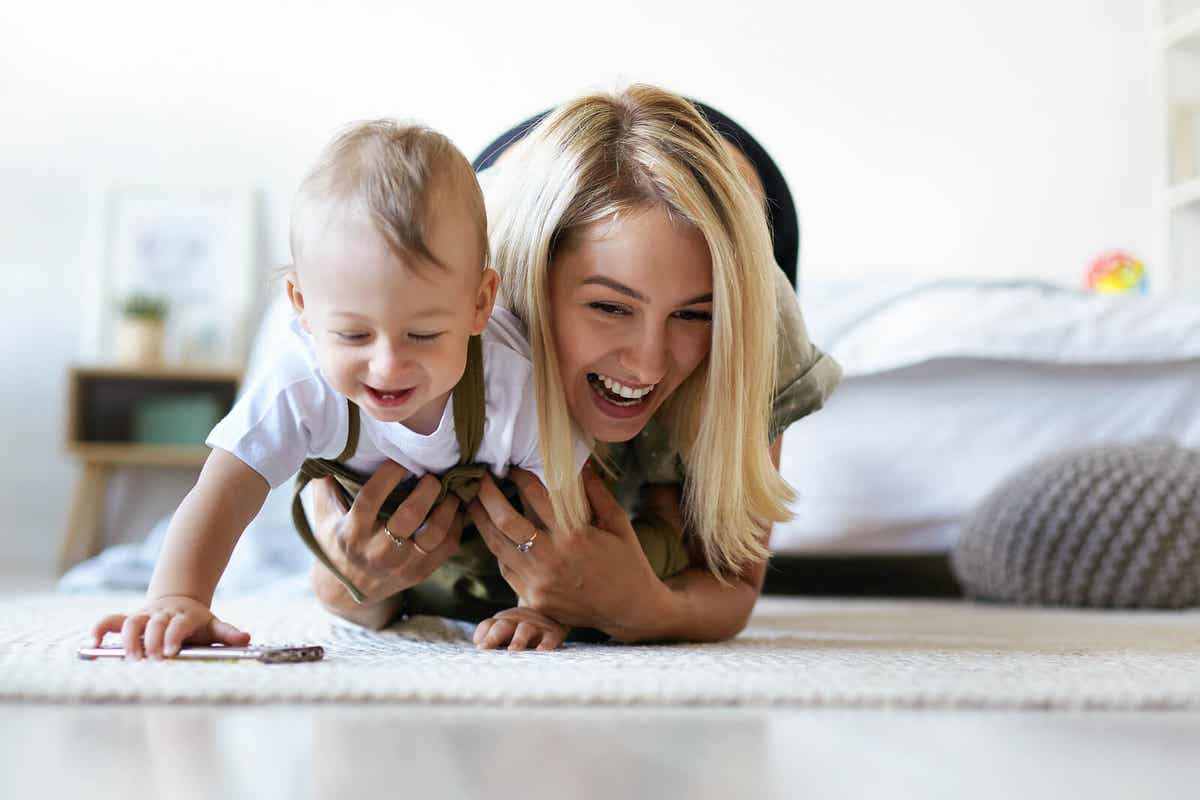8 Development Exercises for 7-to-9-Month-Olds

A baby that’s stimulated and exercises regularly will reach the expected milestones before those who don’t exercise. In addition, this will benefit their psychomotor and cognitive development. So, in this article, we’re going to look at development exercises for babies between 7 and 9 months.
During these three months, the baby is more independent. They won’t need Mom or Dad to come to them because they can reach them by crawling. In the seventh month, they start understanding words and their meaning. Then, by the end of the ninth month, some kids can even say their first words.
Psychomotor development between 7 and 9 months
In this time of the baby’s life, we can see that they’re more of a person and less of a baby. During this stage, their movements are more intentional, which helps their psychomotor development.
At 7 months
- Babies explore the objects in their hands and move them around to observe them.
- They can sit for a while.
- If you put them sitting up, they can put their hands on the floor in front of them to help support their weight.
- They can roll when lying on their stomach and turn onto their back.

At 8 months
- When objects or toys are far away, they start trying to get them.
- They start experimenting with the objects in their hands. They throw them on the ground to see how they fall and what noise they make.
- Babies start crawling on the ground to reach objects that are far away.
- If you put them upside down, they can separate one of their hands from the ground.
- If they’re lying down and holding on to something, they can sit up by themself.
- Some children are already crawling.
At 9 months
- They can already wave goodbye.
- If they want someone to pick them up, they raise their arms.
- They can pick up small objects with their hands.
- They can use both hands to pick up objects and bump them together to make noise.
- Without help, they learn to sit up by themselves.
Development exercises for 7-to-9-month-olds
These exercises will be very useful to improve your baby’s development. In addition, they promote other skills that they need to learn during these months.
Climbing over obstacles
These obstacles could be a rolled-up rug or blanket, a small mattress or mat, a low bench, etc. The safest is for them to climb on you while you’re lying down. You can leave the baby on one side and have them climb over you to get to the other side. Or, you could use objects to have your child move over them.
Rings to help them get up
You should do this exercise during the 7th month. For this, you can put some rings in their playpen so the child can hold them to get up. At first, you can help them. Then, they can use the rings to stand all by themself.
Getting up with the bars of the crib
Another variant of the previous exercise is putting the child inside their crib near the bars and showing them a toy on top. Then, they have to hold on to the bars to get up and be able to reach the object you have above them.
Catching moving objects
Show the baby a toy while shaking it. The goal is for them to be able to grab the object while it’s in motion. When they do it, you can make it harder by moving the toy faster and choosing larger objects.
Picking up objects that are inside a container
Put an object or toy your child likes inside a box, basket, or any other container and put it in front of them. The goal is to get the child to reach in and take out what’s inside. Then, you can make it harder by choosing a smaller container. This way, they’ll have to work from different positions with their arms.
More development exercises for babies

Picking up small toys to develop fine motor skills
Put small objects in front of your baby so they can touch them with their fingers. One very important thing is that parents make sure they don’t put the objects in their mouths.
This object can be a button, a stone, a marble, a chickpea, etc. As long as they’re small, they’ll force the child to use only their fingers to pick them up. This way, it works the baby’s fine motor skills.
In the beginning, you can put it on a soft surface, since it’ll be easier. Then, you can make it more difficult by putting it on a harder surface.
Delivering toys or objects when we ask for them
Place a few objects or toys in front of the baby and ask them to give them to you. Reach out and wait for them to give it to you. Surely, they won’t release the objects, as this is hard for them at this age. Then, take it from them and keep asking for more.
This exercise aims to teach the child to hold their hands out. In this case, you’re trying to get them to open the palm of their hand.
Kneading
If you’re making dough for a meal, you can take advantage of it by letting your child touch it, press it, stretch it, etc. Then, not only are you helping them with their fine motor skills, but also their imagination.
Conclusions regarding development exercises for babies between 7 and 9 months
As you can see, these are just some of the development exercises for your baby between 7 and 9 months. In addition, there are many more that you can do with your child. Putting them into practice will ensure that your child progresses very positively in their development.
Take advantage of the fact that they’re more active and want to play. In addition to entertaining them, these development exercises favor their psychomotor development. What are you waiting for to try them out?
All cited sources were thoroughly reviewed by our team to ensure their quality, reliability, currency, and validity. The bibliography of this article was considered reliable and of academic or scientific accuracy.
- Le Boulch, J. (1995). El desarrollo psicomotor desde el nacimiento hasta los 6 años. Paidòs Ibèrica.
- Koch, J. (2013). 333 juegos divertidos para estimular el crecimiento de tu bebé. Ediciones Martínez Roca.
- Flores, J. (2013). Efectividad del programa de estimulación temprana en el desarrollo psicomotor de niños de 0 a 3 años. Revista Ciencia y Tecnología, 9(4), 101-117. https://revistas.unitru.edu.pe/index.php/pgm/article/view/426
